AWM41 1001 - [Nurses Narratives] Staff Nurse Fay Mackellar
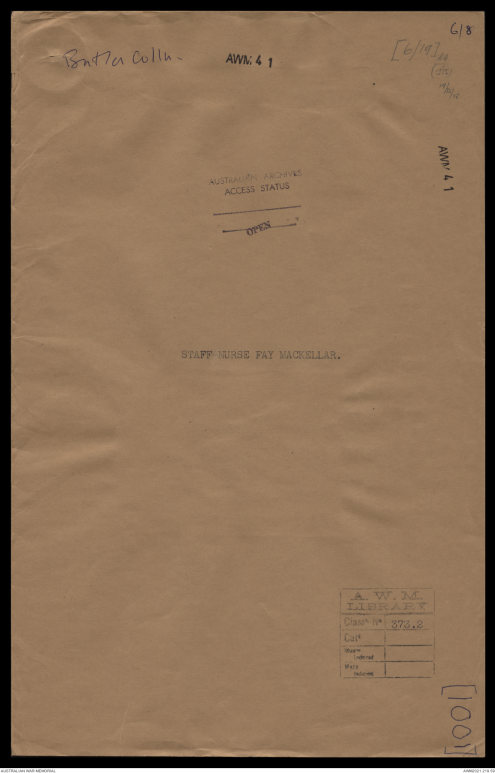
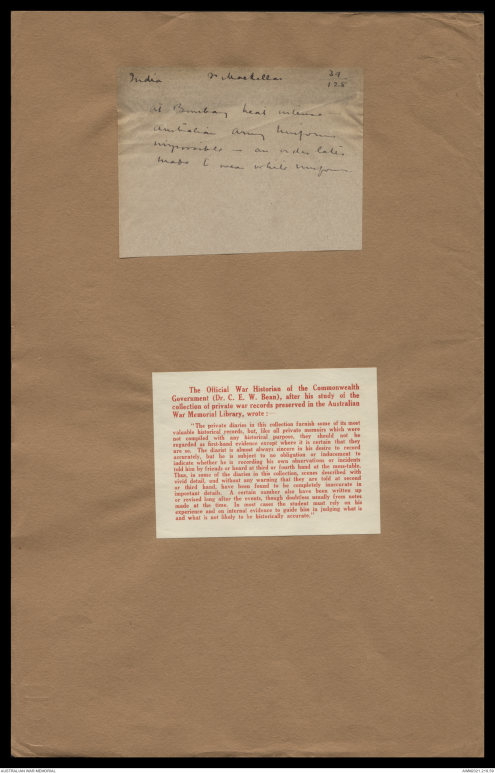
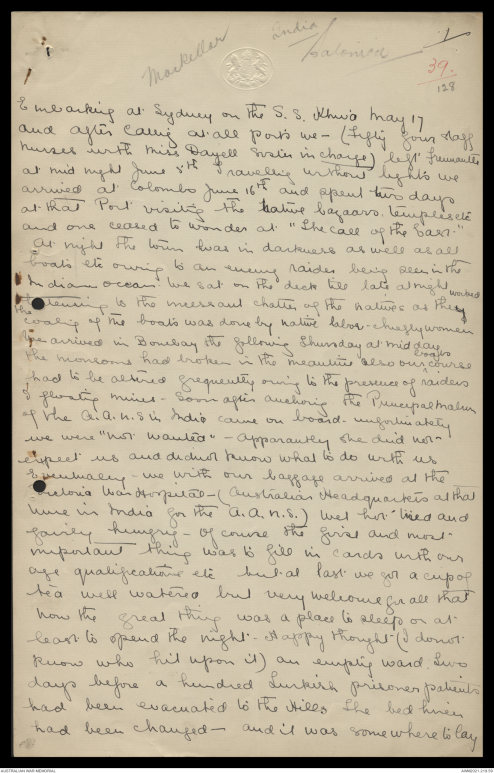
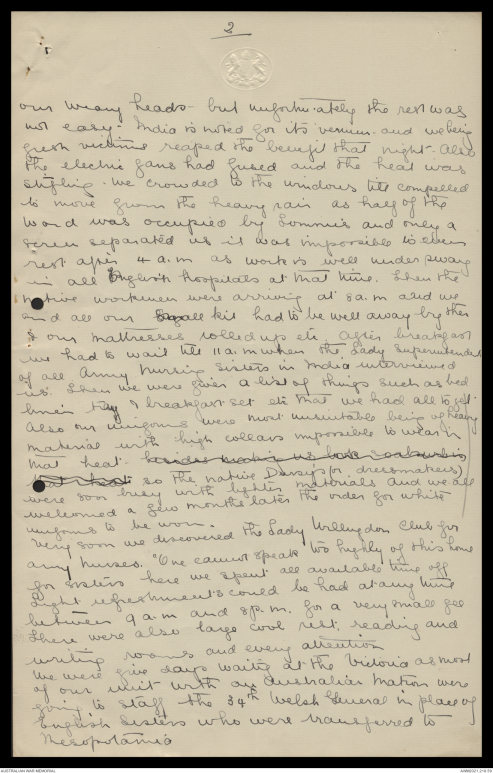
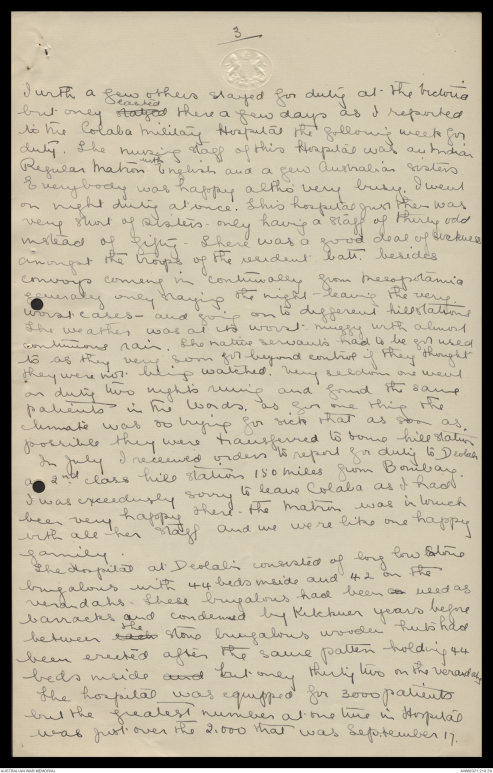
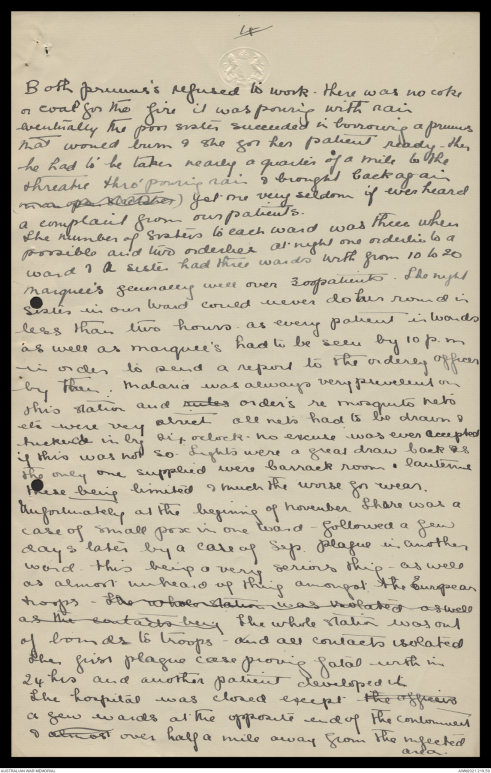
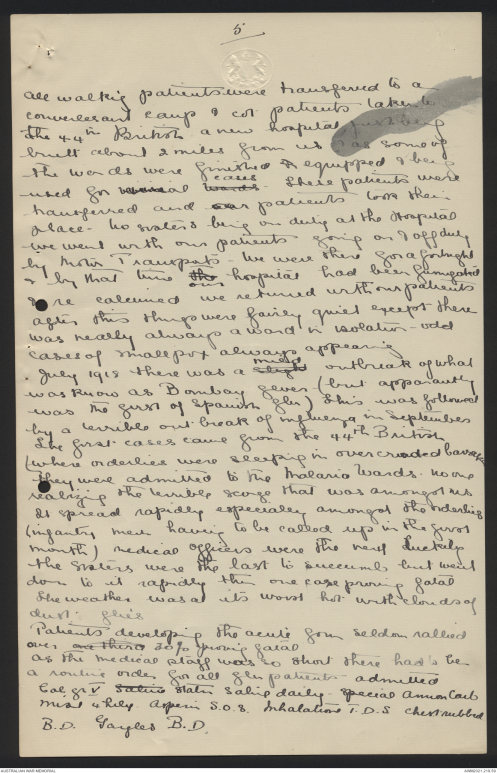
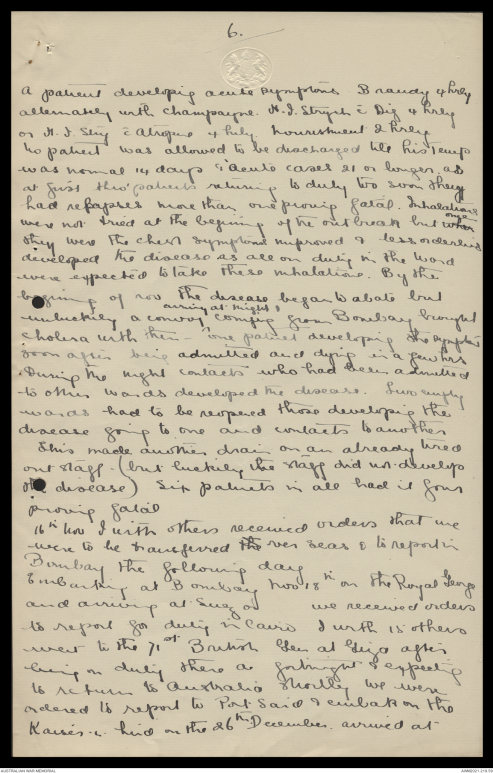
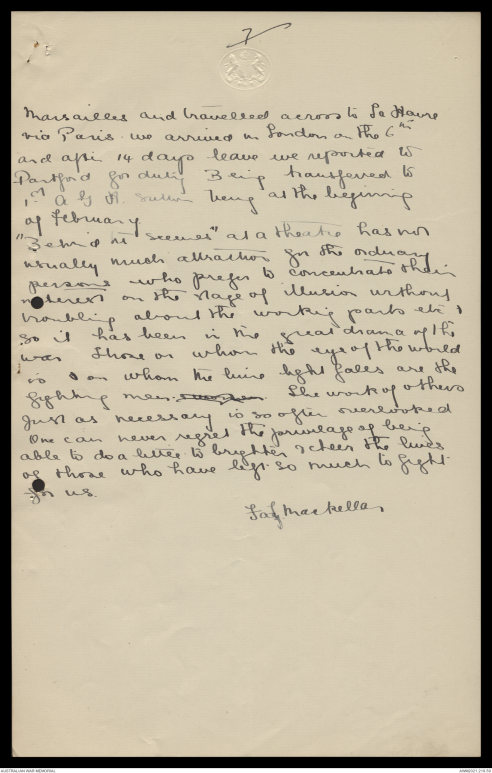
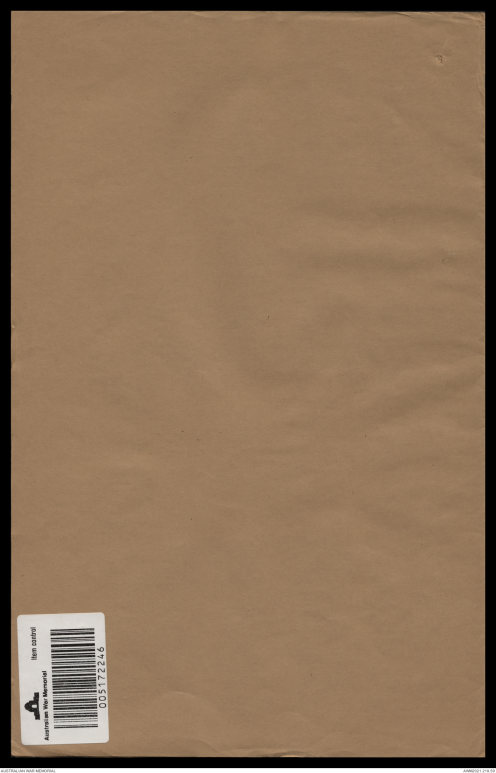
Butler Colln
AWM 4 1
6/8
[6/19] [[?]]
AUSTRALIAN ARCHIVES
ACCESS STATUS
OPEN
STAFF NURSE FAY MACKELLAR.
A.W.M.
LIBRARY
Classn No. 373.2
[1001]
India
N. Mackellar
39/128
At Bombay heat intense
Australian Army uniform
impossible - an order later
made to wear white uniform.
The Official War Historian of the Commonwealth
Government (Dr. C. E. W. Bean), after his study of the
collection of private war records preserved in the Australian
War Memorial Library, wrote :
"The private diaries in this collection furnish some of its most
valuable historical records, but, like all private memoirs which were
not compiled with any historical purpose, they should not be
regarded as first-hand evidence except where it is certain that they
are so. The diarist is almost always sincere in his desire to record
accurately, but he is subject to no obligation or inducement to
indicate whether he is recording his own observations or incidents
told him by friends or heard as third or fourth hand at the mess-table.
Thus, in some of the diaries in this collection, scenes described with
vivid detail and without any warning that they are told at second
or third hand have been found to be completely inaccurate in
important details. A certain number also have been written up
or revised long after the events, though doubtless usually from notes
made at the time. In most cases the student must rely on his
experiences and on internal evidence to guide him in judging what is
and what is not likely to be historically accurate."
1
Mackellar
India / Salonica
39/128
Embarking at Sydney on the S.S. Khiva May 17
and after calling at all ports we - (fifty four staff
nurses with Miss Dayell Sister in charge) left Fremantle
at mid night June 5th. Travelling without lights we
arrived at Colombo June 16th and spent two days
at that Port visiting the Native bazaars temples etc
and one ceased to wonder at "The call of the East"
At night the town was in darkness as well as all
boats etc owing to an enemy raider being seen in the
Indian ocean. We sat on the deck till late at night
listening to the incessant chatter of the natives as they worked
the coaling of the boats was done by native labor - chiefly women
We arrived in Bombay the following Thursday at midday
the monsoons had broken in the meantime also our boats course
had to be altered frequently owing to the presence of raiders
& floating mines. Soon after anchoring the Principal Matron
of the A.A.N.S. in India came on board - unfortunately
we were "not wanted" - apparently she did not
expect us and didn't know what to do with us
Eventually we with our baggage arrived at the
Victoria War Hospital - (Australian Headquarters at that
time in India for the A.A.N.S.) Wet hot tired and
fairly hungry - of course the first and most
important thing was to fill in cards with our
age qualifications etc but at last we got a cup of
tea well watered but very welcome for all that
now the great thing was a place to sleep or at
least to spend the night. Happy thought (I don't
know who hit upon it) an empty ward. Two
days before, a hundred Turkish prisoner patients
had been evacuated to the Hills. The bed linen
had been changed - and it was somewhere to lay
2
our weary heads but unfortunately the rest was
not easy. India is noted for its vermin and we being
fresh victims reaped the benefit that night. Also
the electric fans had fused and the heat was
stifling. We crowded to the windows till compelled
to move given the heavy rain as half of the
ward was occupied by Tommies and only a
screen separated us it was impossible to even
rest after 4a.m. as work is well under sway
in all English Hospitals at that time. Then the
native workmen were arriving at 8a.m. and we
and all our lugall kit had to be well away by then
& our mattresses rolled up etc. After breakfast
we had to wait till 11a.m. when the Lady Superintendent
of all Army Nursing Sisters in India interviewed
us. Then we were given a list of things such as bed
linen tray & breakfast set etc that we had all to get
Also our uniforms were most unsuitable being of heavy
material with high collars impossible to wear in
that heat. besides making us look so absurd in
that heat so the native Dursy's (or dressmakers)
were soon busy with lighter materials and we all
welcomed a few months later the order for white
uniforms to be worn.
Very soon we discovered the Lady Willingdon Club for
army nurses. "One cannot speak too highly of this home
for sisters here we spent all available time off.
Light refreshments could be had at any time
between 9 a.m. and 8 p.m. for a very small fee.
There were also large cool rest, reading and
writing rooms and every attention
we were five days waiting at the Victoria as most
of our unit with our Australian Matron were
going to staff the 34th Welsh General in place of
English Sisters who were transferred to
Mesopotamia.
3
I with a few others stayed for duty at the Victoria
but only stayed lasted there a few days as I reported
to the Colaba Military Hospital the following week for
duty. The nursing staff of this Hospital was an Indian
Regular Matron with English and a few Australian sisters.
Everybody was happy altho very busy. I went
on night duty at once. This hospital just then was
very short of sisters - only having a staff of thirty odd
instead of fifty. There was a good deal of sickness
amongst the troops of the resident batt. besides
convoys coming in continually from Mesopotamia
generally only staying the night- leaving the very
worst cases - and going on to different hill stations.
The weather was at its worst muggy with almost
continuous rain. The native servants had to be got used
to as they very soon got beyond control if they thought
they were not being watched. Very seldom one went
on duty two nights running and found the same
patients in the wards as for one thing the
climate was so trying for sick that as soon as
possible they wee transferred to some hill station.
In July I received orders to report for duty to Deolali,
a 2nd class hill station 150 miles from Bombay.
I was exceedingly sorry to leave Colaba as I had
been very happy there - the Matron was in touch
with all her staff and we were like one happy
family.
The Hospital at Deolali consisted of long low stone
bungalows with 44 beds inside and 42 on the
verandahs. These bungalows had been xx used as
barracks and condemned by Kitchener years before
between each the stone bungalows wooden huts had
been erected after the same pattern holding 44
beds inside and but only thirty two on the verandahs
The hospital was equipped for 3000 patients
but the greatest number at one time in Hospital
was just over the 2,000 that was September 17.
4
Both primus's refused to work - there was no coke
or coal for the fire it was pouring with rain
eventually the poor sister succeeded in borrowing a primus
that would burn & she got her patient ready - then
he had to be taken nearly a quarter of a mile to the
theatre thro' pouring rain & brought back again
on an open stretcher yet one very seldom if ever heard
a complaint from our patients.
The number of sisters to each ward was three when
possible and two orderlies at night one orderlie to a
ward & a sister had three wards with from 10 to 20
Marquee's generally well over 300 patients. The night
sister in our ward could never do her round in
less than two hours as every patient in wards
as well as Marquee's had to be seen by 10 p.m.
in order to send a report to the orderly officer
by then. Malaria was always very prevelent on
this station and rules order's re mosquito nets
etc were very strict. All nets had to be drawn &
tucked in by six o'clock no excuse was ever accepted
if this was not so. Lights were a great draw back as
the only one supplied were barrack room lanterns
these being limited & much the worse for wear.
Unfortunately at the beginning of November there was a
case of smallpox in one ward - followed a few
days later by a case of Sep. plague in another
ward this being a very serious thing - as well
as as almost unheard of thing amongst the European
troops - The whole station was isolated as well
as the contact being the whole station was out
of bounds to troops - and all contacts isolated.
The first plague case proving fatal with in
24 hrs and another patient developed it.
The hospital was closed except the officers
a few wards at the opposite end of the containment
& almost over half a mile away from the infected area.
5
All walking patients were transferred to a
converlescent camp & cot patients taken to
the 44th British a new hospital just being
built about 2 miles from us as some of
the wards were finished & equipped & being
used for xxxal cases. These patients were
transferred and our patients took their
place. No sisters being on duty at the Hospital
we went with our patients going on & off duty
by Motor Transports. We were there for a fortnight
& by that time the our hospital had been fumigated
& re calcined we returned with our patients
after this things were fairly quiet except there
was nearly always a ward in isolation - odd
cases of smallpox always appearing.
July 1918 there was a slight mild outbreak of what
was known as Bombay fever (but apparantly
was the first of Spanish flu) This was followed
by a terrible out break of influenza in September.
The first cases came from the 44th British
where orderlies were sleeping in overcrowded barracks.
They were admitted to the Malaria Wards no one
realizing the terrible scorge that was amongst us.
It spread rapidly especially amongst the orderlies
(infantry men having to be called up in the first
month) medical officers were the next. Luckily
the Sisters were the last to succumb but went
down to it rapidly then one case proving fatal.
The weather was at its worst hot with clouds of
dust & flies.
Patients developing the first acute form seldom rallied
over one third 30% proving fatal.
As the medical staff was so short there had to be
a routine order for all flu patients admitted
Cal gr V saline statin saline daily special Ammon Carb
mist 4 hrly asperin S.O.S. Inhalations T.D.S chest rubbed
B.D. Gargles B.D.
6.
A patient developing acute symptoms Brandy 4 hrly
alternately with Champagne. N.I. Strych ċ Dig 4 hrly
or N.I. Stry ċ Atropine 4 hrly. Nourishment 2 hrly
No patient was allowed to be discharged till his temp
was normal 14 days & acute cases 21 or longer as
at first these patients returning to duty too soon they
had relapses more than one proving fatal. Inhalations
were not tried at the beginning of the outbreak but when once
they were the chest symptoms improved & less orderlies
developed the disease as all on duty in the ward
were expected to take these inhalations. By the
beginning of Nov the disease began to abate but
unluckily a convoy ^arriving at night & coming from Bombay brought
Cholera with them - one patient developing the symptoms
soon after being admitted and dying in a few hrs.
During the night contacts who had been admitted
to other wards developed the disease. Two empty
wards had to be reopened those developing the
disease going to one and contacts to another.
This made another drain on an already tired
our staff. (but luckily the staff did not develop
the disease) Six patients in all had it four
proving fatal.
16th Nov I with others received orders that we
were to be transferred the over seas & to report in
Bombay the following day.
Embarking at Bombay Nov 18th on the Royal George
and arriving at Suez on we received orders
to report for duty in Cairo I with 15 others
went to the 71st British Gen at Ghiza after
being on duty there a fortnight & expecting
to return to Australia shortly we were
ordered to report to Port Said & embark on the
Kaiser-i-Hind on the 26th December arrived at
7
Marsailles and travelled across to Le Havre
via Paris we arrived in London on the 6th
and after 14 days leave we reported to
Dartford for duty. Being transferred to
1st A.G.H. Sutton being at the beginning
of February.
"Behind the scenes" at a theatre has not
usually much attraction for the ordinary
persons who prefer to concentrate their
interest on the stage of illusion without
troubling about the working parts etc &
so it has been in the great drama of the
war. Those on whom the eye of the world
is on & on whom the lime light falls are the
fighting men and women. The work of others
just as necessary is so often overlooked
One can never regret the privilage of being
able to do a little to brighten & cheer the lives
of those who have left so much to fight
for us.
Fay Mackellar
Australian War Memorial
Item control
005172246
 Sam scott
Sam scottThis transcription item is now locked to you for editing. To release the lock either Save your changes or Cancel.
This lock will be automatically released after 60 minutes of inactivity.